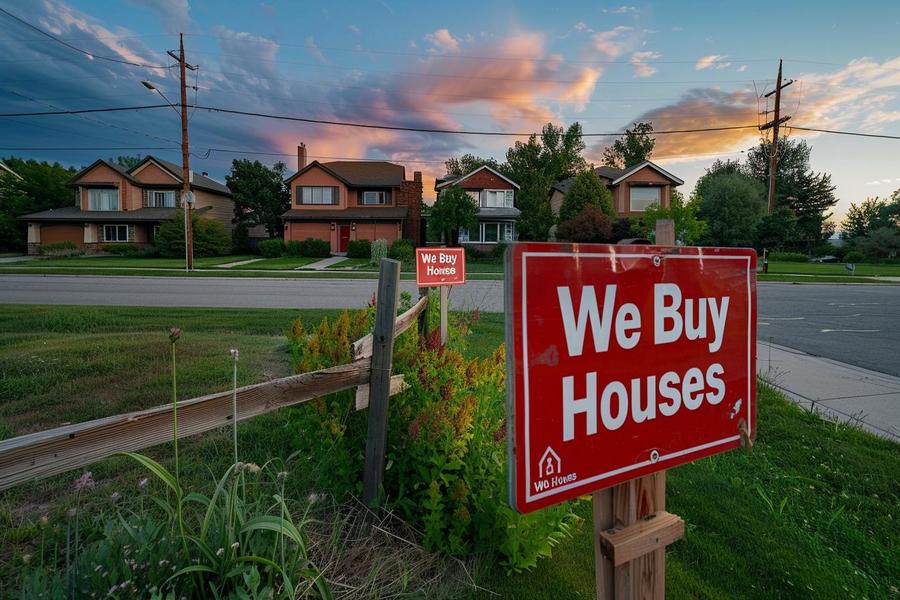Facing a tough choice between a short sale and foreclosure? You're not alone. Many homeowners find themselves in this spot. Let's break down the key differences. This way, you can make a smart choice for your future.
TL;DR:
- Short sales occur when a home sells for less than its owed mortgage, needing bank approval, impacting credit less harshly than foreclosures.
- Foreclosure is lender-enforced, severely affects credit, and can hinder buying another home for years.
- Differences include voluntary (short sale) vs. non-voluntary (foreclosure), varying timeframes, and credit impact magnitude.
- Short sales offer homeowners more control and quicker recovery possibilities, while foreclosures offer potential buyers quicker, albeit riskier, purchasing opportunities.
- Understanding state laws, potential impacts on future housing, and consulting experts is crucial for both processes.
What Exactly is a Short Sale in Real Estate?
Short sales happen when homes sell for less than what the owner owes the bank. This is not like a foreclosure, where the bank takes the house if the owner can't pay the mortgage. In a short sale, the owner needs the bank's okay to sell for less.
First, what starts a short sale? It starts when you can't pay what you owe on your home loan. Here, you need to ask your bank if you can sell your home for a lower price. Let me note, banks don't always say yes to a short sale.
Now, who can do a short sale? Your bank must check if you qualify for a short sale. This usually means you must prove you really can't pay your mortgage. It's a bit serious and needs lots of papers.
Also, doing a short sale can take a lot of time. It's not just about finding a buyer. The bank has to look at your offer and decide if it's good. This can take some months, so it’s a slow process.
So, short sales let you sell your home and get out from under the debt, but you still might owe money after. It's key to think about this and maybe talk to a real expert before you decide to go ahead. Short sales can affect your credit but not as much as a foreclosure. Always, check for the best step for your situation.
How Does Foreclosure Work?
Foreclosure happens when a homeowner can't pay their mortgage. The lender takes the home to get back the money owed. In places like Florida, this process can start after a few missed payments.
The Legal Process of Foreclosure
In the legal steps, the court gets involved, and it's a public affair. This means everyone can know about one's foreclosure. It can be quite a stressful time for the homeowner involved.
Timeframe: How Long Does Foreclosure Take?
It's not quick; it can take a couple of years. On average, it spans about 941 days from start to end.
Consequences of Foreclosure for the Homeowner
It impacts credit badly. It could take years, often five or more, until someone can buy a home again. It also leaves a mark on one's credit report which can affect future loans and credit opportunities.
Each state has its own rules that guide how foreclosures work. These laws outline what lenders need to do to foreclose on a home and what rights homeowners have during the process. Knowing your state’s laws can be crucial. For example, you might want to understand the specifics of the foreclosure process.
Foreclosure is not only about losing a home. It brings a long-term financial burden and can affect one's life significantly. Consider it carefully if you're in a tight spot with your mortgage payments. Seeking advice from financial and legal experts might help to explore possible alternatives.
Related Links:
–How To Sell A Fixer Upper House Fast: Simple Guide
–Selling a House with Code Violations: A Guide
What Are the Major Differences Between Short Sales and Foreclosures?
Let's talk homes in tough times. Facing a home payment issue? You have options. Two common ones are short sales and foreclosures. They might sound similar, but they have big differences.
Short sales are voluntary; foreclosures aren't. In a short sale, you choose to sell your home for less than you owe on your mortgage. You need your lender's okay to do this. Foreclosure, though, happens when your lender takes your home because you can't make payments. Each state has its own foreclosure rules.
Now, how do they impact your credit? Both hurt, but foreclosures can hurt more. A short sale might lower your credit score by up to 160 points. Foreclosure can drop it by 240 points. Big difference!
Short sales take time and lots of paperwork. Your lender must agree to the sale price and terms. They could say no if they think they'll get more money by foreclosing.
Foreclosures are faster once they start. The lender takes your home and tries to sell it quickly to get their money back. In some places, this process can be really quick. In others, not so much. For example, in New York, a foreclosure can take about 3 years!
With a short sale, you could buy another house sooner than with a foreclosure. After a short sale, you might wait two years to buy again. After foreclosure? Five years or more.
So, think about these differences if you're faced with hardship. Do you want more control with a short sale? Or let the bank take over with a foreclosure? The choice impacts your money, credit, and future home buying. Choose wisely!
Are Short Sales Better Than Foreclosures for the Homeowners?
Short sales can be better than foreclosures. They tend to hurt your credit less. In a short sale, you sell your home for less than what you owe. You still pay the loan’s leftover part. This process needs your lender's yes before it starts.
Foreclosures can hit your credit more and are not in your hands. The bank takes your home and sells it to get their money back. This action follows state rules and often ends in a sale at an auction.
Now, let's get into details. Choosing a short sale lets you have some control over selling your home. It can also mean less impact on your chance to buy homes later. Often, you can look for a new home sooner than if you went through foreclosure. Foreclosure can block you from buying another home for about five years. Short sales may let you buy again in a shorter time.
The way these options affect your feelings matters, too. Losing your home in a foreclosure can feel very harsh. It often means you have to leave quickly. A short sale gives you a bit more time to plan and move.
In short, short sales and foreclosures are tough choices. But often, a short sale can offer a smoother move and less stress on your credit. It’s a tough spot to be in, but knowing your options helps a lot.
How Do Short Sales and Foreclosures Affect Potential Buyers?
When buying, knowing about short sales and foreclosures is key. A short sale happens when the sale price won't cover the mortgage balance. Here, the seller's lender must agree to a lesser payoff. A foreclosure occurs when a homeowner fails to pay their mortgage, leading the lender to seize and sell the home.
The impact on buyers varies greatly. Let's dig into the buying process first. For short sales, patience is necessary. It can take a long time as you wait for lender approvals. Sometimes months or more. Yet, this can mean a lower price compared to normal market listings. But, it's complex and you deal with lots of paperwork.
Foreclosures can be quicker. Once the home is repossessed, the lender often wants to sell fast to recoup losses. This can lead to good deals for buyers. But remember, these homes are usually sold 'as-is', so they might need costly repairs.
In short sales, since they are less rushed, homes might be in better condition. Owners have a vested interest in keeping up the property to ensure the sale. In foreclosures, since the lender is now in charge, property maintenance might lag, leading to additional expenses for buyers post-purchase.
When it comes to financing, there are differences too. Financing a short sale is like most home buys. You can use loans or cash. With foreclosures, options vary. Some foreclosed homes need cash owing to their condition, though some lenders do offer special loans.
Both buying paths have risks. But knowing these can turn them into potential wins. You could finish with a valuable property under market value. Whether a short sale or a foreclosure better suits your needs depends on your situation, finances, and how much time and effort you're willing to invest. Always consider these factors when embarking on buying a distressed property.
Can Homeowners Avoid Foreclosure Through Alternatives Like Short Sales?
Yes, homeowners can avoid foreclosure through options like short sales. In a short sale, you sell your home for less than you owe on your mortgage. This needs your lender's okay. It's one way to dodge the harsh hits of a foreclosure.
Foreclosure is when the lender takes back your home because you can't make payments. This process hurts your credit more and makes it hard to buy another home soon. In places like Florida or California, where many face these choices, knowing these details matters.
Say you live in Miami and your payments fall behind. You might think about a short sale. This is tough, but it can be better than letting the bank force you out and sell your home. Your credit might recover faster this way, helping you buy another home sooner than if you let it go to foreclosure.
But, short sales are not simple. They require lots of paperwork and the bank's approval. Sometimes banks say no if they think they can get more money from a foreclosure. This makes it crucial to act fast and talk to your lender if you're struggling.
For those considering these paths, understanding long-term impacts is key. Both options can drop your credit score, but a short sale may leave a softer mark. Also, after a short sale, buying a home again might happen in less time compared to after a foreclosure.
Thinking about a short sale? It could save your credit and help you bounce back quicker. Check out how foreclosure affects your credit for more insights. This info could make a big difference in your decisions.
Tips for Navigating a Short Sale or Foreclosure as a Buyer
Buying a distressed property can be tricky. Let's make it simpler here. When you get into buying a foreclosed home or a short sale, you'll find quite different rules.
Preparing Finances: What Buyers Need to Know
Can you finance a short sale? Yes, but it’s complex. Financing a short sale demands patience and a clear understanding of the process. Banks must approve the sale, and this can take time. You can also buy a short sale home with an FHA loan. This can help if you have lower credit or a smaller down payment.
Working with Real Estate Professionals: Finding the Right Help
The key to handling either transaction is your team. You need experts who know the ins and outs. A real estate agent with experience in distressed properties can guide you. They handle the paperwork and talk to the banks. It’s their job to smooth out the process for you.
Evaluating the Property: Inspections and Valuations in Distressed Sales
Inspecting the property is crucial. Distressed properties often need repairs. A good inspector can find problems before you buy. This way, you know what costs you're facing up front.
Remember, whether it’s a foreclosure or a short sale, your approach will affect your success. Each has its steps, its pace, and its challenges, but with the right preparation and help, you can navigate these waters effectively. Be patient, stay informed and work with those who know what they’re doing. This can make a big difference in outcomes when dealing with distressed properties.
We covered short sales, foreclosures, their differences, and impacts on buyers and sellers. Short sales can be less harmful than foreclosures for homeowners. Both have unique challenges for buyers. Knowing your options, like short sales, can help avoid the worst of foreclosures. Always seek expert advice when navigating these complex situations.















